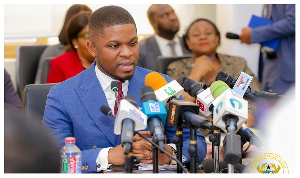Accra, July 28, GNA - Professor Emmanuel Gyimah-Boadi, Executive Director of Centre for Democratic Development (CDD), on Monday called for the establishment of conventions that would curb the discretionary powers of the executive.
He noted that the President and the entire executive had too much discretionary powers under the constitutions and that fed into corruption and extreme politicization of things. "We do not necessarily have to amend the constitution or establish new laws to curtail the discretionary powers of the executive - we can establish conventions around the constitution to place some restriction on the exercise of those powers," he said.
Prof. Gyimah-Boadi made the call at a day's seminar to train journalists on how to promote issue-based reporting in an election year. The seminar was sponsored by the French Embassy and was attended by about 20 journalists.
Prof. Gyimah-Boadi cited the size of the government, which comprised of 80 ministers, saying that was a clear sign of arbitrary use of executive discretionary powers at the expense of the taxpayer, since all those ministers and their assistants were being paid from the Consolidated Fund.
He observed that the manner and the rampancy with which the President establishes new state agencies, re-configures and expands ministries at anytime he pleased, were all signs of arbitrary use of executive discretion, which had cost implications for the taxpayer. "It is even more sad that Parliament with all the powers it has at its disposal to curb executive spending, seem to look on helplessly and rather complain about its own inadequate budgetary allocations, and yet keep sanctioning the executive wastage," he said.
Prof. Gyimah-Boadi said even though the constitution allowed the president to make as many appointments as he wished, there should be conventions that restricted him from going beyond a certain point since it had cost implications for the country.
He also touched on abuse of incumbency saying that, even though the phenomenon seem to have gone down since 2004, it manifested itself in more sophisticated forms, citing the Ministry of Information and National Orientation (MINO) Bill Boards which spelt out the achievements of the NPP government as a against what they inherited from the NDC. "It is okay if those bill boards were paid for by the NPP as a party, but coming from the MINO means that they used state funds and yet they are using it to promote the incumbent party instead of to promote Ghana as a state," he said.
Prof. Gyimah-Boadi noted that the recent incidence, where the Chief Director of the Ministry of Health, Alhaji Mohamed Nurudin. D. Jawula, attended an NPP rally and dressed in party colours was not a sign of respect for the spirit of the constitution.
"If someone from a minority party had done the same would the person have survived as a public officer," he asked.
He noted that it was particularly unethical for a leading member of a party, which claimed to abide by rule of law to behave in the manner Alhaji Jawula did, especially being a traditional ruler as well. Prof. Gyimah-Boadi noted that, Alhaji Jawula's behaviour and refusal to do what was ethical and moral, which was to have resigned after his action in accordance with the call by the Head of Civil Service, was an example of the failure of the incumbent to live up to their grand statements and promises.
He noted that the incumbent for instance promised to cut down on the number of ministers and also to ensure that District Chief Executives (DCEs) were elected into office, but they had gone back on their promise.
"Recently I questioned one minister what the government was doing about the election of DCEs and he told me the constitutional provisions regarding their appointment was an entrenched one so they cannot change it," he said.
Prof. Gyimah-Boadi said it was for reasons such as those that journalists should take politicians on and ensure that they did not just get away with loose talk and empty grand statement, which were not actionable.
"Most of what politicians say is hot air and it is up to the journalist to separate the wheat from the chaff and guide the electorate to the real issues of national interest as we go for elections. "Journalists must demand direct commitments from politicians seeking our mandate to govern this country and we must ask them how they intend to deal with the issues that of concern to us," he said. Dr. Audrey Gadzekpo, Director of the University of Ghana School of Communications also cited the public buses, saying that, it was abuse of incumbency for the NPP to have painted those buses with their party colours, whereas the other political parties did not have the opportunity to do the same.
She called on journalists to make it a point to interrogate politicians not just on what they intend to do when they came to power but also how they plan to do it.
"The means by which they intend to fulfill their several promises should be of interest to the public more than what they promise to do," she said. Dr. Gadzekpo asked journalists to weigh the public interest against the promises of politicians and put the light on whether political promises necessarily match the aspirations of the citizens. Dr. Sena Gabianu said journalists should be asking why 20 year old policies and promises were still political promises today, adding, "we need to find our why those promises were not implemented and how those seeking power intend to make them happen."
She noted that the current development plan for the nation was the Growth and Poverty Reduction Strategy (GPRS2), saying that most politicians did not know what that document said, and yet they claimed they could transform the country in four years.
Dr. Peter Qaurtey, Deputy Head of the University of Ghana Centre for Migration Studies said journalists needed to push politicians towards policies that ensured that "we own our development strategy and that our economy is not being remotely ran by western powers." 28 July 08
General News of Monday, 28 July 2008
Source: GNA












